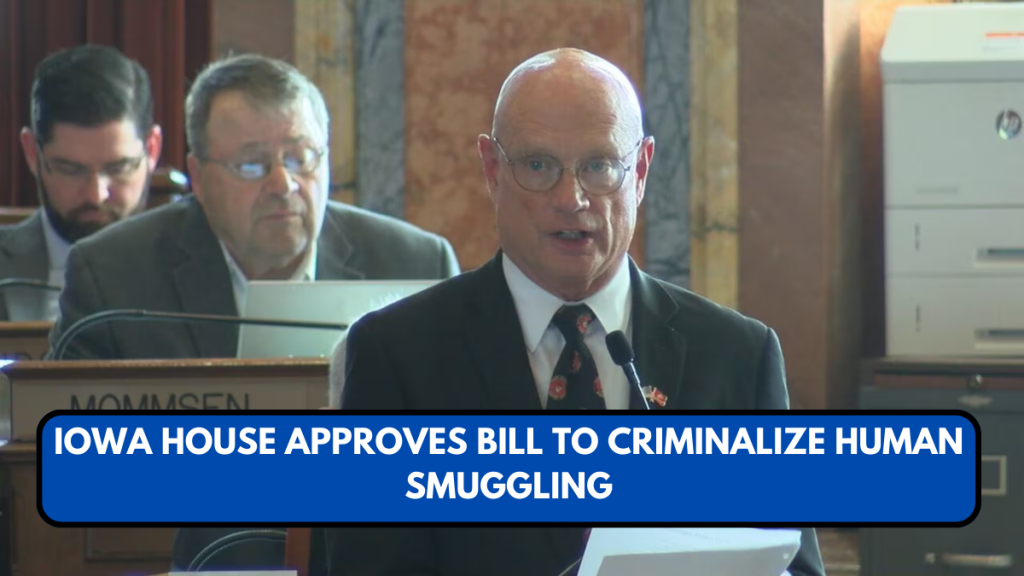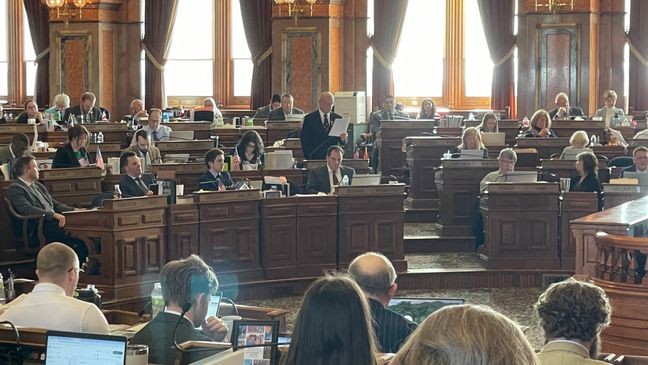
Des Moines, Iowa — The Iowa House of Representatives has passed a new bill, House File 572, aimed at combating human smuggling by formally establishing it as a criminal offense under state law. The measure, which passed with a strong bipartisan vote of 75-14 on March 20, 2025, marks a significant step in the state’s efforts to address human trafficking and related crimes.
The bill now moves to the Iowa Senate for further consideration.
What the Bill Does?
House File 572 creates a new category of criminal behavior, clearly defining “human smuggling” and setting out strict penalties for violators.
According to the bill, an individual commits human smuggling if they:
- Transport a person with the intent to conceal them from law enforcement,
- Encourage or induce someone to enter or stay in the U.S. illegally by hiding them,
- Direct two or more individuals to enter or remain on agricultural land without the consent of the landowner.
The bill also outlines graduated felony charges based on the severity of the offense:
- Class C Felony: Standard charge for most human smuggling offenses, punishable by up to 10 years in prison and fines up to $13,660.
- Class B Felony: Applied if the act involves a minor, is done for profit, includes a firearm, or endangers life — punishable by up to 25 years in prison.
- Class A Felony: The most severe charge, reserved for cases involving sexual abuse, serious injury, or death. A Class A felony carries a mandatory life sentence without the possibility of parole.
For more on felony classifications and sentencing, refer to the Iowa Code – Felonies.
A Renewed Legislative Push

This is not the first time Iowa lawmakers have taken up the issue. A similar version of the bill was passed by the House in 2024 but failed to gain traction in the Senate. This year, lawmakers are optimistic that the legislation will make it through both chambers.
“This bill is about protecting the most vulnerable and giving law enforcement the tools they need,” said Rep. Steven Holt (R-Denison), one of the bill’s leading advocates. “We must make it absolutely clear that smuggling human beings — for labor, profit, or exploitation — will not be tolerated in our state.”
Rep. Holt added that the legislation is designed to combat not just illegal immigration, but the networks of trafficking and exploitation that often accompany it.
Mixed Reactions and Clarifications
Despite its bipartisan support, the bill sparked concern among some Democratic lawmakers and community organizations. Critics worry that the vague language could unintentionally criminalize religious and humanitarian groups that assist undocumented immigrants with shelter, food, or transportation.
Rep. Lindsay James (D-Dubuque) expressed concern that the bill could discourage faith-based and nonprofit organizations from providing help. “We’re afraid this could lead to legal risks for churches or community groups offering basic humanitarian aid,” she said during the House debate.
In response, Holt clarified that the bill targets only those who intentionally hide individuals from law enforcement or facilitate illegal entry for criminal purposes.
“This is not about going after Good Samaritans,” Holt explained. “It’s about organized smuggling operations and those who profit off human misery.”
Part of a Broader National Conversation
Iowa’s legislative push comes amid increasing national debates around immigration enforcement, border security, and human trafficking. According to the U.S. Department of Homeland Security, human smuggling is often tied to organized criminal groups that exploit vulnerable migrants for financial gain.
The DHS also notes that human smuggling is distinct from human trafficking, though the two crimes can overlap. Smuggling typically involves the illegal transportation of individuals across borders, while trafficking involves exploitation through force, fraud, or coercion.
Iowa’s bill attempts to distinguish these offenses while also enhancing legal tools to combat both.
Next Steps

House File 572 now awaits deliberation in the Iowa Senate. If passed, it will be sent to Governor Kim Reynolds for signing. Given the strong support in the House and a growing public concern over human trafficking, lawmakers are hopeful the bill will be signed into law before the legislative session ends.
To track the status of House File 572, visit the Iowa Legislature’s official site.
Conclusion
House File 572 represents a focused effort by Iowa lawmakers to address a growing concern over human smuggling and trafficking within the state. While the bill has received strong bipartisan support, it also highlights the delicate balance between law enforcement and humanitarian aid — a debate that continues to evolve nationwide.
As the legislation moves forward, both supporters and critics will be watching closely to ensure the law is enforced in a way that targets criminals without unintentionally penalizing those providing legitimate assistance to vulnerable individuals.



